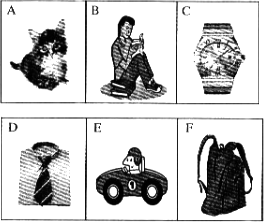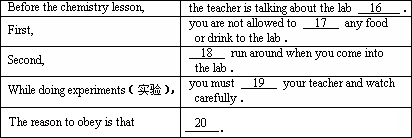
题目列表(包括答案和解析)
听对话,选择与对话内容相符的图片,将代表图片的字母填在相应的序号后。每段对话读两遍。(共5分,每小题1分)

1.( ) 2.( ) 3.( ) 4.( ) 5.( )
二.听对话,根据对话内容,判断第6-10小题所给句子的正误。正确的写T,错误的写F。每段对话读两遍。(共5分,每小题1分)
听第一段对话,判断第6-7小题。
6.Bob has changed a lot.
7.Now Tina has long hair.
听第二段对话,判断第8-10小题。
8.Jim and Alice have to stay at home on school nights.
9.They are allowed to go out on Saturday nights.
10.They are talking outside the classroom at the school.
三.听对话,根据对话内容,从下列各题所给的A、B、C三个选项中,选择最佳选项。每段对话读两遍。(共5分,每小题1分)
听第一段对话,回答第11-12小题。
11.What are the two speakers talking about?
A.Joe’s problem.
B.Mr.Andrews’ problem.
C.Mrs.Wilson’s problem.
12.What is the relationship(关系)between the two speakers?
A.Teacher and student.
B.Mother and son.
C.Parent and teacher.
听第二段对话,回答第13-15小题。
13.How does Mary feel about her new neighbors?
A.She doesn’t like them.
B.She’s mad about their son.
C.She feels silly to talk with them.
14.Which of the following is Mary most worried about?
A.Her children can not get enough sleep.
B.Her new neighbors’ radio makes great noises.
C.She doesn’t know how to deal with her neighbors’ son.
15.What suggestion does the man make?
A.Mary should call up her neighbors to complain.
B.Mary should talk with her neighbors about the problem.
C.Mary should try her best to get her children to sleep early.
四.听短文,根据短文内容,完成下面的表格。短文读三遍。(共10分,每小题2分)
注:chemistry化学;lab实验室

听力测试(本大题共20分,每小题1分)
第一节(共10小题)
听下面10段短对话,每段对话后有一个小题,从题中A、B、C三个选项中选出最佳选项。听完每段对话后,你都有10秒钟的时间来回答有关小题和阅读下一小题。每段对话读两遍。
听第1至10段材料,回答第1至10题。
1.Which is the man's favourite animal?
A.
B.
C.
2.What did Walter do yesterday?
A.
B.
C.
3.What will people use in this city in ten years?
A.
B.
C.
4.Where does Mary want to go this summer vacation?
A.
B.
C.
5.When did the man arrive?
A.At 5∶35
B.At 5∶55
C.At 5∶45
6.What will the man have to do next week?
A.He will lend some money to the woman.
B.He will borrow the money from the woman.
C.He will give the money back to the woman.
7.What does Lucy mean?
A.The film is wonderful.
B.She missed the film.
C.The film is boring.
8.Where is Sandy now?
A.In America.
B.In Japan.
C.At home.
9.What does the man mean?
A.He agrees to close the windows.
B.He wants to leave the windows open.
C.He wants to open the windows.
10.What is the probable relationship(关系)between the speakers?
A.Classmates.
B.A teacher and a student.
C.A teacher and a parent.
第二节(共10小题)
听下面3段长对话和短文,每段对话和短文后有几个小题,从题中A、B、C三个选项中选出最佳选项。听每段对话和短文前,你将有时间阅读各个小题,每小题6秒钟,听完后,每小题将给出6秒钟的作答时间。每段对话和短文读两遍。
听第11段材料,回答第11、12题。
11.Why isn't Peter's father coming home for dinner?
A.He's tired after working all the morning.
B.He has to work for another eight hours.
C.He's busy helping the sick man now.
12.What does Peter's father do?
A.A policeman.
B.A doctor.
C.A firefighter.
听第12段材料,回答第13至15题.请根据短文内容,选择正确答案,完成信息记录表。

13.
A.Eating differently
B.Eating manners
C.Eating habits
14.
A.eat well
B.eat more
C.eat less
15.
A.noisily
B.quietly
C.comfortably
听第13段材料,回答第16至20题。
16.Why did the speaker go to a language school?
A.To teach English.
B.To learn some English.
C.To see his friends from America.
17.How many days a week did the speaker go to the language school?
A.Five days.
B.Six days.
C.Seven days.
18.What did the speaker do one day during the break?
A.Asked for something to eat.
B.Thanked Alice for the cake.
C.Asked Alice a question.
19.What did the speaker think after Alice answered the question?
A.Alice was very helpful.
B.Alice wanted something else except a piece of cake.
C.America was really a “money” country.
20.Why did Alice look at the speaker with a big smile?
A.The speaker was very funny.
B.The speaker understood her in the wrong way.
C.Alice was very friendly to the speaker.
| A.Quiet and lonely. | B.Relaxed and excited. |
| C.Active and lively. | D.Happy and easygoing. |
| A.often went to school late | B.did well at school |
| C.did a good job at school | D.failed in the exams |
| A.didn’t know what to do about her son | B.would drive her son away from the house |
| C.had no money to support the family | D.would have to hang up |
| A.The head teacher. | B.The school adviser. |
| C.Karl himself. | D.The passage doesn’t tell us. |
| A.children in single-parent families always have mental problems |
| B.mother’s love is important to teenagers’life |
| C.parents should give their children everything that they need |
| D.school education still works well without the support from parents |
My teenage son Karl became withdrawn after his father died. As a single parent, I tried to do my best to talk to him. But the more I tried , the more he pulled away. When his report card arrived during his junior year, it said that he had been absent 95 times from classes. In this way he would never graduate. I sent him to the school adviser, and I even begged him. Nothing worked.
◆ One night I was at work when I got a phone call. A man introduced himself as a head teacher. “ I want to talk to you about Karl’s absences(缺席).” Before he could say another word I choked up(哽咽). And said sadly, “ I love my son. I’ve tried everything to get Karl to go back to school and nothing has worked. It’s out of my hands.” For a moment there was silence on the other end of the line. The head teacher seriously said, “ Thank you for your time.”
◆ Karl’s next report card showed a marked improvement in his grades. He was even on the list of the best students at school. In his fourth year, I took part in a parent-teacher meeting.I noticed that his teachers were surprised at the way he had turened himself around. On our way home, he said, “ Mum, remember that call from the head teacher last year?” I nodded. “That was me. I thought I’d play a joke but I heard what you said, It really hit me how much I was hurting you.That’s when I knew I had to make you proud.”
阅读短文内容, 选择正确答案。(5分)
【小题1】Which of the following has the similar meaning to the underlined word “withdrawn”?
| A.Quiet and lonely. | B.Relaxed and excited. |
| C.Active and lively. | D.Happy and easygoing. |
| A.often went to school late | B.did well at school |
| C.did a good job at school | D.failed in the exams |
| A.didn’t know what to do about her son | B.would drive her son away from the house |
| C.had no money to support the family | D.would have to hang up |
| A.The head teacher. | B.The school adviser. |
| C.Karl himself. | D.The passage doesn’t tell us. |
| A.children in single-parent families always have mental problems |
| B.mother’s love is important to teenagers’life |
| C.parents should give their children everything that they need |
| D.school education still works well without the support from parents |
| A.Quiet and lonely. | B.Relaxed and excited. |
| C.Active and lively. | D.Happy and easygoing. |
| A.often went to school late | B.did well at school |
| C.did a good job at school | D.failed in the exams |
| A.didn’t know what to do about her son | B.would drive her son away from the house |
| C.had no money to support the family | D.would have to hang up |
| A.The head teacher. | B.The school adviser. |
| C.Karl himself. | D.The passage doesn’t tell us. |
| A.children in single-parent families always have mental problems |
| B.mother’s love is important to teenagers’life |
| C.parents should give their children everything that they need |
| D.school education still works well without the support from parents |
湖北省互联网违法和不良信息举报平台 | 网上有害信息举报专区 | 电信诈骗举报专区 | 涉历史虚无主义有害信息举报专区 | 涉企侵权举报专区
违法和不良信息举报电话:027-86699610 举报邮箱:58377363@163.com